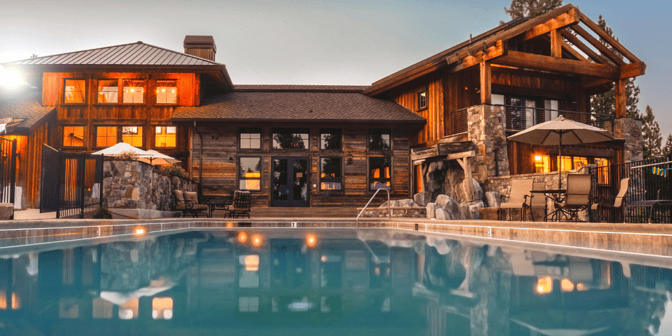The American dream is not one size fits all. Some borrowers want to purchase a second home where their family can vacation for part of the year. Buying property as a second home could mean a cabin in the mountains, a beachside bungalow, or anything in between.

The vision is up to you. But what’s important is that you understand that buying a second home is completely attainable for many people. That’s right: Buying property as a second home can be within your reach, but it starts with understanding the second home mortgage requirements.
Second Home vs. Investment Property
Let’s clear one thing up before we discuss second home mortgage requirements. While an investment property may in fact be the “second home” you purchase—after your primary residence—that is viewed as a different product with a different purpose in the eyes of mortgage lenders.
A second home is an additional dwelling for you and your family. It can act as a personal vacation home, a place to stay when visiting family, or as your retirement home in a few years. While you may be able to rent out your second home on a short-term basis, the primary purpose of this property is for you and your family. With that in mind, you cannot rely on the rental income this home may generate when qualifying for a second home loan.
Down Payment
Most lenders require at least 10% down on a second home, though 20% down tends to be standard. Lenders need to see that you’re committed to buying a second home, as it’s easier to walk away from a home that isn’t your primary residence. A larger down payment may also help you avoid higher interest rates.
As with a primary residence, you can obtain your down payment by tapping into savings, utilizing a monetary gift from a relative or domestic partner, or liquidating investments. You may even be able to use some of the equity in your primary residence when buying a second home by using a cash-out refinance or home equity loan. Your loan adviser can help you navigate this process.
You might be thinking, “But there are loan programs that don’t require any money down,” and you would be right. However, these are government-backed mortgages or down payment assistance, which cannot be used for second home purchases. Most second home loans are conventional loans, although FHA loans can be used as well.
Credit Score
Every lender is different, but credit standards tend to be a bit tighter when qualifying for a second home mortgage. That’s because a primary residence provides shelter, whereas a second home is a “nice-to-have,” not a necessity.
Lenders may consider applicants with a score of 620 or higher, though a score above 700 is preferable when qualifying for a second home mortgage. Naturally, lenders will also want to look at your credit history, taking into account any late mortgage payments, exorbitant credit card balances, and bankruptcies. The more you are extended with various debt payments, the higher risk you may be for the lender.
Debt-to-Income (DTI) Ratio
You’re not a stranger to this; you’ve been around the block before when you purchased your primary residence. Like last time, lenders will want to analyze your debt-to-income ratio—or the amount of money going out versus the money coming in.
You need to understand that this time your existing mortgage payment will be factored into your DTI, along with other monthly payment debts, including credit cards, student loans, and auto payments. Remember, too, that you cannot offset your DTI by factoring in any forward-looking rental income that you may be able to collect by renting out your second home. That would make this an investment property. Investment properties come with investment property mortgages, with a different set of mortgage requirements.
When qualifying for a second home mortgage, lenders generally want to see that your debt, which would include your new mortgage, will represent 43% or less of your pre-tax monthly income. This number can sometimes vary depending on your credit score and down payment.
As with a primary mortgage, you can get pre-approved for a second home loan, so it’s always a good idea to talk to a loan officer before you enlist a real estate agent to search for properties.
Reserves
Things happen. Mortgage professionals know this more than anyone, which is why they like to see some liquidity from second home buyers. This comes in the form of reserve funds.
Well-qualified borrowers generally need to show at least two months of reserve funds that can cover both their primary and secondary mortgages, property taxes, and insurance should their income or employment change. Weaker borrowers and those who are self-employed may need to show six months of reserve funds.
Is a Second Home Right for You?
Though the process of qualifying for a second home mortgage isn’t that different from qualifying for a primary home, borrowers may face a little more scrutiny and tighter lending standards on these properties. You should also keep in mind that these homes may have tax implications, short-term rental restrictions, and additional condo or HOA fees. These are all things to consider when determining whether a second home is right for you.
APM is always standing by to help with your housing-related needs. Give us a call today to go over your unique financial situation and the process of qualifying for a second home loan.


